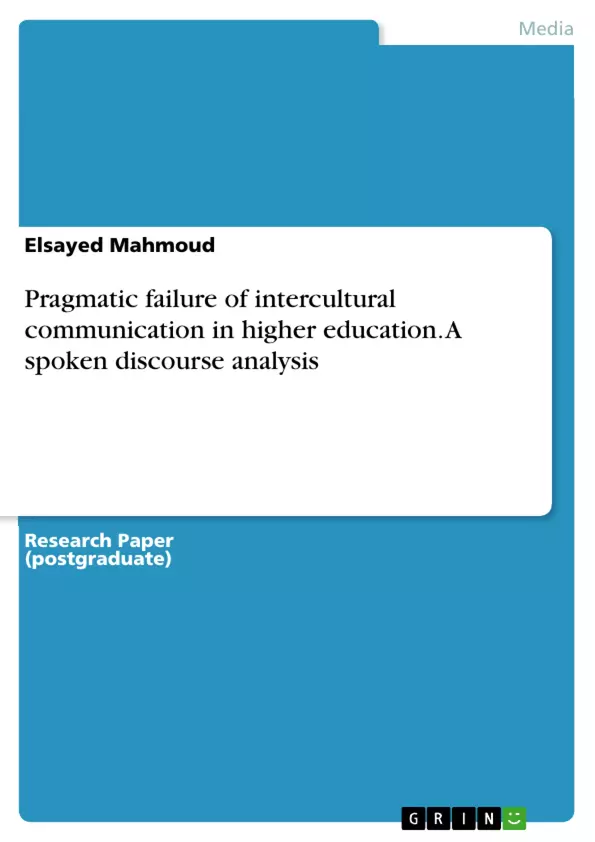The researcher of this paper is interested in analyzing spoken discourse. Due to the absence of cross-cultural awareness there could be a high obstacle in understanding the message that is perfect linguistically. This could generally mirror pragmatic failure and in particular, in the classrooms.
This research paper therefore aims at analyzing many conversations to the language in use in different contexts for achieving the following:
- Highlighting the importance of intercultural awareness betweenEnglish speakers / learners as well as the problems caused by itsabsence.
- Analyzing different spoken discourses on pragmatic failure interms of words, sentence, discourse and Intonation.
- Defining the intercultural competence, pragmatic competenceand discourse analysis.
- Presenting the relationship between the discourse analysis andculture.
- Recommending pedagogical implications to English authors,teachers, educational policy makers and learners.
As the number of non-native speakers has become recently increasing and has surpassed the number of native speakers, the culture of non-native speakers could not be ignored in the interaction between non-native speakers to native speakers or between the non-native speakers to native-speakers. Hence, the importance of cultural dimension in communicative competence has been also increasing between English learners and speakers.
Inhaltsverzeichnis (Table of Contents)
- Background of the Study
- Introduction
- A rationale for the choice of topic
- Purpose of the Study
- Significance of the Study
- Questions of the study
- Literature Review
- Intercultural competence (ICC), Discourse and pragmatic competence
- Cultural studies and Discourse analysis
- Methodology
- Data analysis of spoken discourse
- Cultural words
- Sentence level
- Discourse level
- Intonation
- Discussion
- Pedagogical implications
- Conclusion
Zielsetzung und Themenschwerpunkte (Objectives and Key Themes)
This paper analyzes spoken discourses between individuals from different backgrounds to highlight the importance of incorporating intercultural competence in educational pedagogy and the potential issues that arise from its absence. The primary objective is to demonstrate that acquiring English should not be isolated from learning the culture it embodies. Key themes explored in the paper include:- The significance of intercultural awareness in English language learning and the challenges posed by its absence.
- The analysis of spoken discourse to identify pragmatic failures related to words, sentence structure, discourse, and intonation.
- The definition and relationship between intercultural competence, pragmatic competence, and discourse analysis.
- The connection between discourse analysis and cultural understanding.
- The development of pedagogical implications for English authors, teachers, educational policymakers, and learners.
Zusammenfassung der Kapitel (Chapter Summaries)
The introduction emphasizes the growing importance of intercultural awareness in education, citing the European Year of Intercultural Dialogue (2008) as evidence. The paper examines spoken discourse to understand the challenges of intercultural communication and the impact of cultural differences on language use. The literature review delves into various approaches to cultural studies, with a particular focus on the ethnography of communication by Hymes. The concept of communicative competence is discussed, highlighting the importance of considering social context beyond structural grammar. The chapter also explores the role of culture in language use and the significance of intercultural competence in achieving effective communication. The methodology section outlines the data analysis techniques employed in the study, focusing on the examination of spoken discourse across different levels: word choice, sentence structure, discourse patterns, and intonation. The discussion section analyzes the collected data, drawing connections between cultural differences and pragmatic failures in spoken discourse. The chapter examines how the absence of intercultural competence can lead to misunderstandings and communication breakdowns. The chapter on pedagogical implications offers practical recommendations for English authors, teachers, policymakers, and learners to foster intercultural awareness and improve communication skills.Schlüsselwörter (Keywords)
The core concepts of the paper center around intercultural competence, pragmatic competence, discourse analysis, and cultural studies. The study explores the intersection of these concepts, examining how cultural differences manifest in spoken discourse and the implications for effective communication in diverse contexts. Key terms include intercultural communication, pragmatic failure, cultural awareness, and communicative competence.Frequently Asked Questions
What is pragmatic failure in intercultural communication?
Pragmatic failure occurs when a speaker produces a linguistically correct sentence, but the message is misunderstood due to a lack of cultural awareness or different social expectations.
Why is intercultural competence important for English learners?
Learning a language cannot be isolated from its culture. Understanding cultural nuances helps avoid misunderstandings in a world where non-native speakers now outnumber native speakers.
How does intonation contribute to pragmatic failure?
Different cultures use intonation to signal politeness, irony, or emphasis. If used incorrectly according to the listener's culture, it can lead to perceived rudeness or confusion.
What is the role of discourse analysis in this research?
Discourse analysis examines language in use across different contexts to identify patterns where cultural differences lead to communication breakdowns.
What recommendations are made for English teachers?
The paper suggests incorporating cultural studies into language teaching and focusing on communicative competence rather than just structural grammar.
- Citation du texte
- Elsayed Mahmoud (Auteur), 2012, Pragmatic failure of intercultural communication in higher education. A spoken discourse analysis, Munich, GRIN Verlag, https://www.grin.com/document/318326



